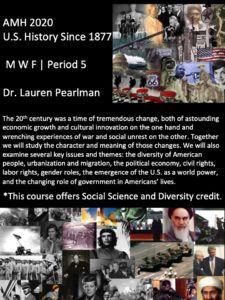
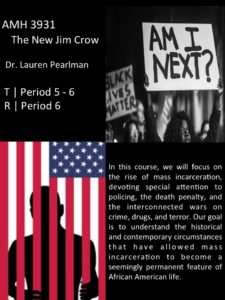
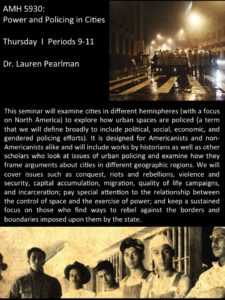
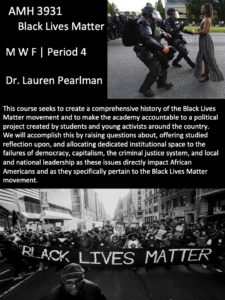
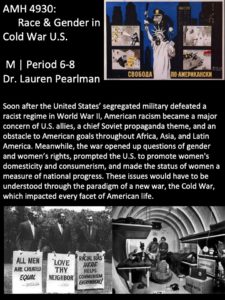
University of Florida
AMH 2020: United States History Since 1877Welcome to AMH2020. This course will cover United States history from the end of Reconstruction in 1877 to the present. Together we will study some of the major social, intellectual, political, and cultural transformations that occurred in the late 19th and 20th century. You will also develop critical thinking, writing, and interpretive skills critical to life in the 21st century. The course is taught chronologically, but we will trace several key issues and themes over time: the diversity of American people, urbanization and migration, the political economy, civil rights, labor rights, gender roles, the emergence of the U.S. as a world power, and the changing role of government in Americans’ lives. The 20th century was a time of tremendous change, both of astounding economic growth and cultural innovation on the one hand and wrenching experiences of war and social unrest on the other. We will try to understand the character and meaning of those changes, both as participants experienced them and as historians look back on them.
Scholar Michelle Alexander argues that mass incarceration is “a stunningly comprehensive and well-disguised system of racialized social control that functions in a manner strikingly similar to Jim Crow.” In fact, more African American adults are under correctional supervision—in prison or jail, on probation or on parole—than were enslaved in 1850. In this course, we will read works by Alexander and other scholars that make connections between race and the criminal justice system. We will focus on punishment in post-civil rights America (including policing, the war on crime, and the war on drugs), examine the social and political implications of mass incarceration, and research possible alternatives to the current system. Our goal is to understand the historical and contemporary circumstances that have allowed mass incarceration to become a seemingly permanent feature of African American life.
During the 2008 presidential campaign, you could not turn on the television without hearing the term “post-racial”—a far cry from the century before, when the great cultural critic W.E.B. Du Bois wrote that “the problem of the Twentieth Century is the problem of the color line.” This course will examine how racial ideology informs contemporary debates about American culture, politics, and social life by reading political writing about race that has appeared in the post-Civil Rights era. The goal of this course is not to trace the history of these texts but to explore in what ways public policy advocates, journalists, academics, filmmakers, and legal analysts write about race as a feature of American life. We will consider the complex question of racial identity and explore how writing and reading about race can both reflect and challenge racial categories, hierarchies, and perceptions.
This semester, we will employ a grassroots approach to understand one of America’s most defining social and political movements: what scholars call the “long civil rights movement.” Rather than focus solely on the best-known moments of the 1950s and 1960s, this course will cover key events, issues, and organizations from the New Negro to the New Jim Crow. We will examine the origins of the movement, especially in relation to World Wars I and II; the development and impact of the mass mobilization efforts of the movement’s defining phase; and more contemporary civil rights issues.
Our goal is to understand the development of the movement as well as the priorities of and outcomes for the everyday, ordinary black citizens who struggled for freedom and the skilled African American activists who helped them organize and mobilize to transform society during the 20th century. What, for example, was the importance of labor activism and international politics, the role of women, and the ideological and tactical transition to black power? How did the African American freedom movement intersect with and influence debates about gender, labor, sexuality, and foreign policy? To answer these and other questions, the course will encompass political, social, and artistic aspects of the movement and examine both historical documents (speeches, letters, reports, pamphlets, and newspaper articles) and creative works (poetry, cartoons, and music). In doing so, we hope to better understand the movement’s successes, failures, and its legacy for this nation.
Soon after the United States’ segregated military defeated a racist regime in World War II, American racism became a major concern of U.S. allies, a chief Soviet propaganda theme, and an obstacle to American goals throughout Africa, Asia, and Latin America. Meanwhile, the war opened up questions of gender and women’s rights, prompting the U.S. to promote women’s domesticity and consumerism and use the status of women as a measure of national progress. These issue would have to be understood through the paradigm of a new war, the Cold War, which impacted every facet of American life. This course examines how the Cold War shaped the postwar period and how Americans responded to the changing postwar political, social, and cultural order during the era. Specifically, it will focus on the ways that ideas about race and gender influenced and were influenced by the Cold War. Topics covered include the civil rights movement, Asian and African decolonization and liberation efforts; the effects of communism, anti-communism, and McCarthyism on race and gender relations; black and white student activism; and gender roles and the family.
This seminar investigates one of the most powerful forces shaping urban environments. We will look at cities in different hemispheres (with a focus on North America) to explore how urban spaces are policed (a term that we will define broadly to include political, social, economic, and gendered policing efforts). We will read works by scholars who look at issues of urban policing and examine how they frame arguments about cities in different geographic regions. We will examine the ways that different structures and agents (city planners, policy makers, police, growth machines) attempt to police urban spaces and how residents find creative solutions to fight back against government policies, local police, and private organizations that encroach upon their rights.
Over the course of the semester, we will cover issues such as conquest, riots and rebellions, violence and security, capital accumulation, migration, quality of life campaigns, and incarceration. Sample questions include: how do various groups define and control territory? How do they make and mark space? What is the role of the various militias, “para-militaries”, mercenaries, and guerrillas in the history of colonial/neo-colonial control of cities? How has neoliberalism changed the policing of cities? How do city dwellers resist policing efforts? We will pay special attention to the relationship between the control of space and the exercise of power and keep a sustained focus on those who find ways to rebel against the borders and boundaries imposed upon them by the state.
This seminar introduces graduate students to major themes and core literature in twentieth-century United States history. We will read a mix of standard texts and newer monographs, with a focus on recent conceptualizations, interpretations, and problems in the field. Particular attention will be paid to making connections between the economy, politics, and social life. We will also integrate the experiences of diverse social groups— African Americans, immigrants, women, LGBTQ people—into broader historical context and larger historical problems. The course will also allow you to explore certain issues in depth by following a single subfield throughout the course. In addition, you will explore one period more rigorously during the semester by reading widely in the literature on a single historiographical issue. Assignments are designed to 1) assist you with professional development, 2) provide you with a rich foundation for qualifying exams, and 3) help prepare you to teach a course in twentieth-century U.S. history.
This seminar examines the history and historiography of American conservatism since the New Deal. The aim is to acquaint graduate students with a rapidly growing body of literature on American conservatism and to explore recent historiographical debates. Despite its widespread use as a political label, the term “conservatism” is far from self-evident as a subject of historical inquiry. The course approaches conservatism not as a fixed set of ideas, but as a complex set of social, political, intellectual, and cultural interactions. We will examine groups and individuals who have claimed the label of “conservative” as well as those who have had that label thrust upon them. We will also discuss a variety of methodological and conceptual approaches, including both “topdown” histories of elite movements and “bottom-up” studies of American populism and political culture. Topics include intellectuals, social movements, business and labor, race and civil rights, anticommunism, religion, national politics, and the state.
United States Military Academy
HI 105, History of the United States, examines the history of the United States from its European colonial roots through the beginning of the 21st century. The course is designed to provide an overview of U.S. History in one semester and complement HI 108, Regional Studies in World History, by providing an understanding of American culture and heritage within the broader mosaic of global themes and historical developments.
Rowan University
HIST 05.375: United States History Since 1945World War II created a new world at home and abroad. The war not only ended the Depression, bringing a larger proportion of the population into the mainstream industrial economy; it also raised questions of integration, equal pay and non-discrimination, full employment, and the right to housing and urban services. These questions would have to be reckoned with under the shadow of a new war, the Cold War, which impacted every facet of American life. This course examines how the Cold War shaped the postwar period and how Americans responded to the changing postwar political, social, and cultural order during the era. We will investigate the origins of the Cold War, the meaning of the Cold War at home, and the moments when the Cold War consensus began to unravel.
We will also look at issues of political economy, civil rights, labor rights, and gender roles that defined postwar America. The fight for racial and gender equality and the politics of identity which they inspired are crucial to the larger story of U.S. history in the second half of the twentieth century. Finally, we will consider how the U.S. has shaped the late-20th century global economic order and, in turn, the impact that the global economy has had on the American economy, work, and social politics. The last half century has been a time of tremendous change, both of astounding economic growth and cultural innovation on the one hand, and wrenching experiences of war and social unrest on the other. We will try to understand the character and meaning of those changes, both as they were experienced by participants and as historians look back on them.